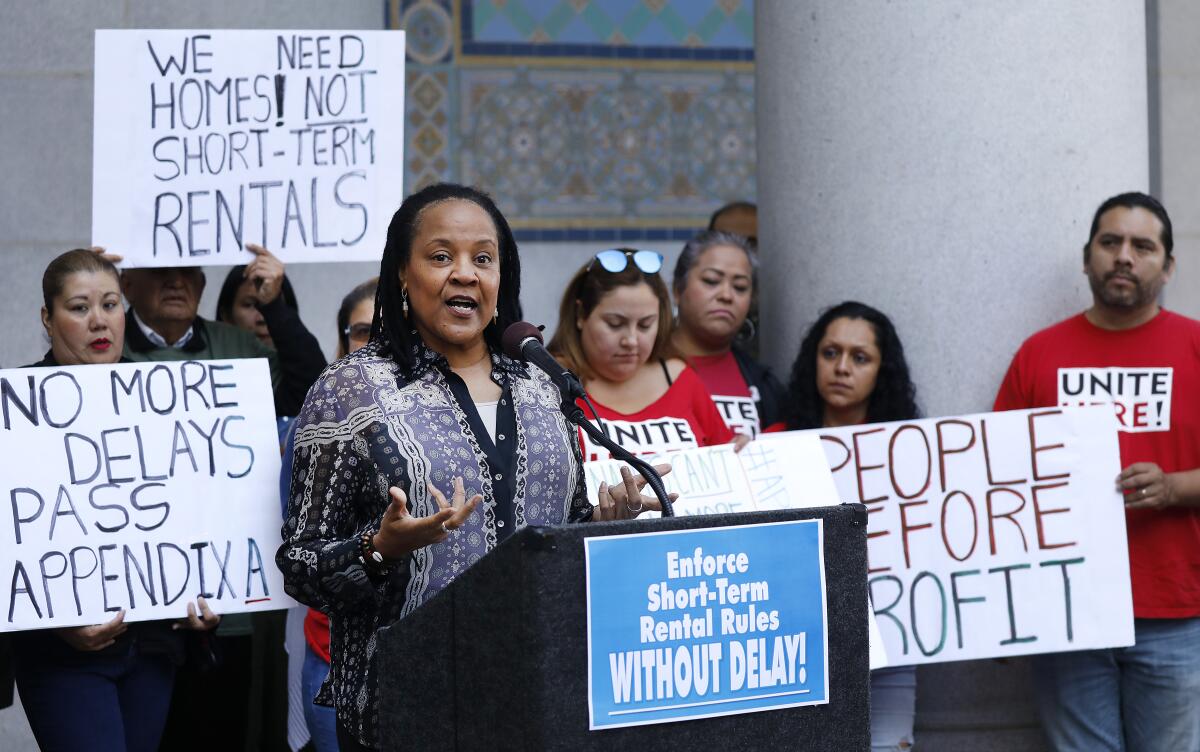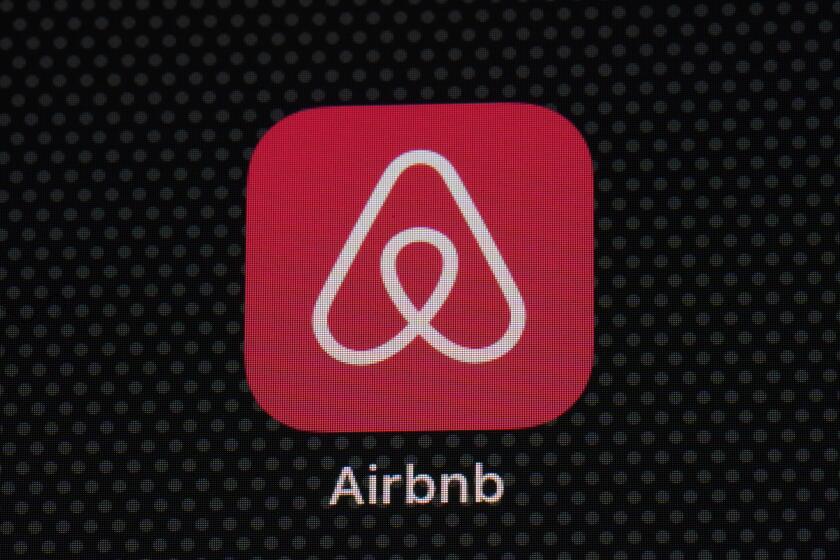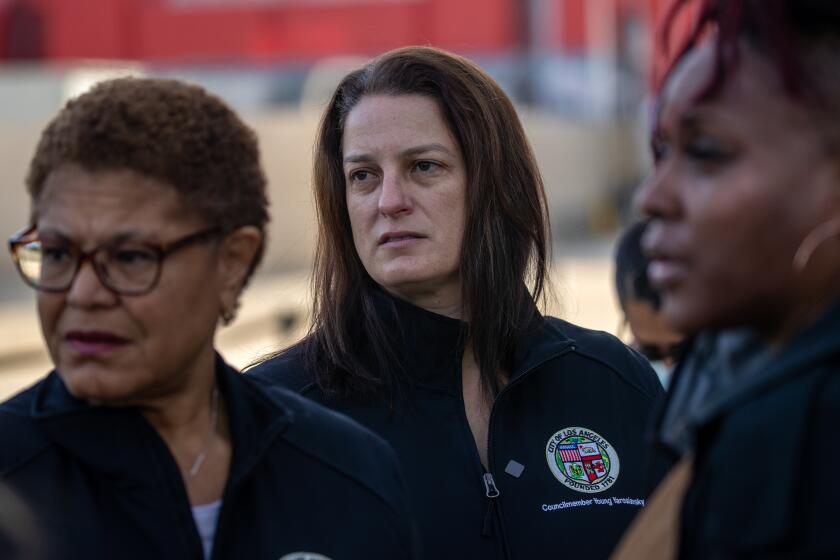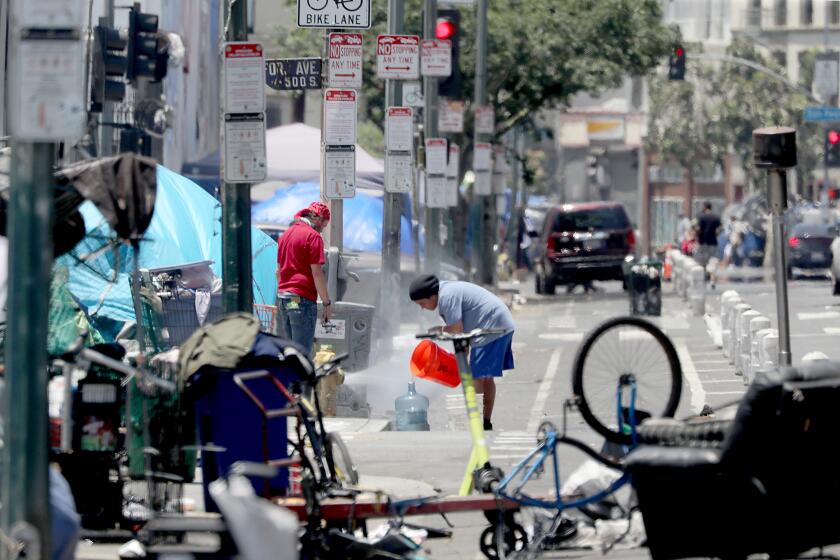Editorial: L.A. needs a better plan to crack down on illegal Airbnbs and short-term rentals

- Share via
Five years ago, Los Angeles passed a law to regulate short-term rentals advertised on Airbnb, VRBO and other websites. The goal was to strike a balance between residents’ desire to earn money by catering to out-of-town visitors and the need to prevent much-needed housing from being converted into de facto hotel rooms.
But the Home-Sharing Ordinance isn’t working as intended. Researchers have found that nearly half of short-term rental listings in Los Angeles are illegal, meaning they’re not displaying a legal license number or the listing violates the city’s rules, such as renting for more than the days allowed or not being the host’s primary residence. Rogue hosts have realized they can flout the rules with few consequences. Neighbors point to short-term rentals that have been turned into party houses and rent-controlled properties that are being used as hotels, which is against the law. But complaints do little; it takes the city two to three years to cite illegal properties.
Thousands of short-term rentals are breaking the law. The city is leaving millions of dollars on the table by not enforcing the rules.
While city leaders are understandably frustrated, a rushed proposal before the City Council would require that short-term rental hosts get a permit from the Los Angeles Police Department and pay a fee. That would create more bureaucracy and government expense without any guarantee of better enforcement of the law. The council should reject it and come up with a plan that actually fixes the problems with the Home-Sharing program.
The proposal is part of a compromise negotiated by Council President Paul Krekorian to get a controversial initiative off the March ballot. That measure was sponsored by the politically powerful hotel workers’ union, Unite Here Local 11, and it would have required that hotels rent vacant rooms to homeless people.
Los Angeles City Councilmember Katy Yaroslavsky did the right thing when she continued to support a homeless housing project amid local opposition.
Krekorian’s deal would have the City Council approve a package of regulations on the development of new hotels and make it voluntary for hotels to rent rooms to homeless people. One of the new regulations would require that both hotels and hosts of short-term rentals get operating permits from the LAPD. Such permits have been required for businesses at higher risk of criminal activity, such as massage parlors, pawn shops and tow truck operators.
There are more than 9,000 short-term rentals and about 400 hotels in Los Angeles, according to the LAPD. Processing permits for all of those properties will nearly triple the department’s workload and require hiring five sworn officers and five civilians.
Solving the homelessness crisis includes ensuring that the people working to help our unhoused population have the means to stay here.
That’s a heavy burden on the LAPD, which is already struggling to hire officers and respond to concerns about crime. And for what? To create a paper trail on hosts? Half of the short-term rentals in L.A. are operating illegally, and in some cases violating existing nuisance laws. It’s unclear why requiring police permits upfront will make it easier to shut down party houses and rogue hosts, when so many operators don’t even bother to get a permit to operate a short-term rental.
Adding another layer of permitting and expense for legitimate, rule-following hosts is not the way to squeeze out illegal hosts. Nor does it makes sense for L.A., which is supposed to be reimagining public safety, to dump another administrative responsibility on the LAPD.
A better approach is to focus on cracking down on bad hosts. Rigorous enforcement of the existing rules and higher penalties against hosts and platforms could bring in tens of millions of dollars in fines — and curb bad actors who take residential units off the market and drive up rents and housing prices, according to David Wachsmuth, a professor at McGill University who has studied L.A.’s short-term rental market.
Last month the Planning Department recommended a suite of changes that could help, including requiring photo ID and documentation to weed out operators who fraudulently declare the property as their primary residence, hiring more inspectors to investigate complaints and creating one office responsible for the permitting and enforcement of short-term rental rules — instead of the seven city departments that share responsibility now.
Those are all good steps, but officials have warned that some of the changes could take months or years to implement, given the plodding pace of City Hall. That’s a problem. It took Los Angeles more than three years to adopt the Home-Sharing Ordinance; it shouldn’t take that long to enact reasonable reforms.
More to Read
A cure for the common opinion
Get thought-provoking perspectives with our weekly newsletter.
You may occasionally receive promotional content from the Los Angeles Times.













